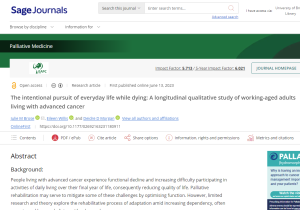Being functionally active, until the end of your days
21 November 2023
This blog was originally published on 21 November 2023 by the European Association for Palliative care.
If you only had a few months left to live, what would you do? What would your everyday life look like? Would your priorities change as time passed and death approached? For Palliative Medicine Editor’s Choice for September 2023, Dr Julie Brose tells us about their research which looked at these important questions and what was the lived experience of everyday life for working-aged adults living with advanced cancer, and how this changed over time.
Whilst working as a palliative care occupational therapist and walking alongside friends and family with life-limiting conditions, I noted that the focus in the healthcare system was often on medical and symptom management. Although symptoms have a well-established impact on daily life, there was limited focus on how to continue participating in everyday activities amid ongoing bodily decline. How did these individuals continue doing what was important to them?
Research has shown that people living with advanced cancer want to participate in meaningful everyday activities for as long as possible, irrespective of increasing dependence and cancer progression. However, how people with advanced cancer adapt to deterioration over time amid ongoing functional decline is not well understood. We wanted to conduct this study to understand and give voice to these everyday life experiences of people living with advanced cancer.
Our study explored the nature of how people adapted to changes in participation in valued activities over time as function declined. To do so, we interviewed adults between the ages of 40 and 64 in Canada. We noted how daily life was experienced and how this changed over the span of 19 months. These adults spoke about how they intentionally adjusted what they did and how they participated in activities to continue doing what was meaningful to them at end of life. The study then mapped findings against the Model of Human Occupation, an empirically developed occupational therapy theory, and illness experience literature.
Three themes came from the interview series with participants. First, participants were intentional in their pursuit of everyday activities. Participating in routine tasks or activities with their loved ones helped maintain a sense of normality during a time of instability, such as going to work, walking the dog, or eating dinner with their partner and children. The desire to continue daily activities remained strong despite declining abilities as their cancer progressed. For example, speaking about time with his two young children, one participant said:
“Your outlook on life changes, so it’s those little things that matter the most. The sit down at the dinner table and being able to talk about the day [with your kids and wife]. Before, it was just kind of eh, it’s part of the day, but it means a lot now” (Peter, Interview 1).
Second, participants spoke of the challenge of unrelenting change and loss, highlighting the uncertainty and continual functional decline that they experienced. The third theme explored the process of adaptation as active and ongoing over their final year of life. These adults spoke about how they adjusted what they did or how they participated in activities to continue doing what was important and meaningful to them, even as their function declined.
“[My husband] takes me for drives… Around here, there are so many scenic drives, like we’re kind of lucky. Yeah, I’m not hiking, I’m not in the backcountry, but I’m still seeing beautiful scenery and spending time with him because he never liked hiking, so it works. We call it going for a walk in the car” (Melissa, Interview 10).
In summary, people living with advanced cancer should be given the opportunity and support to participate in their daily activities during the progression of their cancer. Despite experiencing disrupted routines, adults in this study highlighted how important it was to them to intentionally engage in their valued, everyday activities. Continued participation in everyday life was made possible by adapting how they took part and what they did; adaptation was an ongoing, active process. Sustained participation in activities enabled the adults in this study to maintain their sense of self and quality of life at the end of life.
Paper
